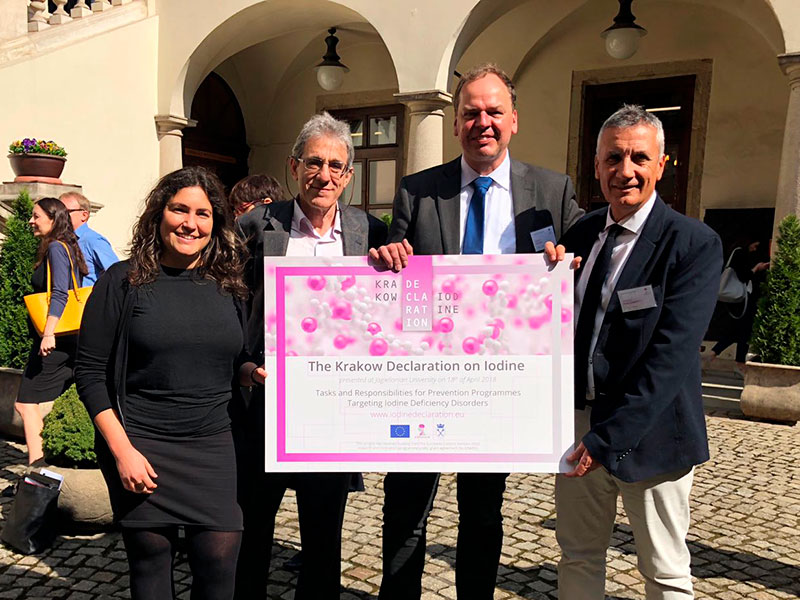A lack of iodine in the diet could threaten brain development in children
The IGTP adheres to the "Krakow Declaration on Iodine"

- Scientists warn that a widespread lack of iodine threatens brain development in children. Iodine insufficiency is one of easiest public health problems to solve, even though it affects so many people worldwide
- According to experts the key to preventing iodine insufficiency is consumption of adequate amounts in a sustained and continued way
- The spanish part of the European Project EUthyroid has been coordinated by the Germans Trias i Pujol Research Institute (IGTP)
Iodine is an essential micronutrient obtained from the water we drink and the food we eat. It is required for the production of thyroid hormones, which are important regulators of metabolism, growth and development. During pregnancy women have a sharply increased need for iodine, which is frequently insufficient in their regular diets. Even mild iodine deficiency puts their children at risk of impaired neurocognitive function and reduced IQ. Iodine insufficiency is one of easiest public health problems to solve, even though it affects so many people worldwide
The EUthyroid Project, including researchers from 27 European countries was created to combat the adverse effects of iodine deficiency and help with prevention. Together they have worked to identify common strategies that contribute to the prevention and eradication of the disorders associated with iodine deficiency (IDD). In Spain, the project was coordinated by the Germans Trias i Pujol Research Institute (IGTP) under the direction of Dr Manel Puig, Director of the IGTP and Principal Investigator at the institute, together with Dr Lluís Vila. Dr. Mònica Guxens, ISGlobal researcher, also had a relevant participation in the project, as a coordinator of one work package. Both Puig and Vila also represent the Catalan Society for Nutrition and Endocrinology of the Catalan Academy for Medical Sciences, of which Dr Vila is president, and the Spanish Society for Endocrinology and Nutrition (SEEN). Both institutions also endorse the "Krakow Declaration", a document that was presented on 18 April and lays down guidelines for prevention of TDDs. The joint declaration urges pubic authorities and society in general to take on responsibility for fulfilling the objectives laid down.
Risks of Iodine Deficiency and the Special Case for Pregnant Women
Although the population should have an adequate supply of iodine, the people at most risk are pregnant women and children as thyroxine is essential for maturation of the brain in the foetus and during the first years of life. Despite this, the majority of pregnant women are unaware of the consequences and currently experts stress that in many European countries with voluntary programmes for increased iodine intake, up to 50% of newborns have a slight iodine deficiency and are at risk of limitations of their cognitive ability. "Although iodine nutrition has increased considerably in Spain in recent years, we have to work to ensure that the supply reaches the whole population, and especially those groups most at risk," insists Dr Vila.
The negative effects of iodine deficiency are varied and can represent a significant load for public health systems. Even though the need has been well demonstrated, European programmes for the prevention of disorders have received very little attention from politicians responsible and the leaders of opinion in society.
Programmes and Projects at European Level
It is very important to stress that iodine deficiency is easily and cheaply avoided by providing iodized salt in the diet. The World Health Organization (WHO) has called for regular testing as a starting point for the elimination of TDDs, but only eight countries in the union have taken the necessary measures to face the problem.
The scientific community is concerned about the deterioration in political commitment to dealing with the problem. For this reason EUthyroid has set up multiple interest groups to call on those responsible for policy, civil servants in public health and scientists to guarantee implementation of effective strategies to prevent deficiencies in all Europe. They call for:
Prevention methods for TDD:
- Methods of IDD Prevention: Regulators and policymakers should harmonize obligatory Universal Salt Iodization to ensure free trade of fortified foodstuffs in Europe. Similarly, iodized animal feed requires regulatory approval to ensure free trade within the EU.
- Control of IDD Prevention: National governments and public health authorities have to perform harmonized monitoring and evaluation of fortification programmes at regular intervals to ensure optimal iodine supply to the population.
- Support for IDD Prevention: Scientists, together with public-health care workers, patient organizations, industry and the public, should support measures necessary to ensure that IDD prevention programmes are sustainable, as appropriate within a rapidly changing environment and further social awareness of the issue.
The signatories of the Krakow Declaration on Iodine ask for support from all stakeholders across Europe and beyond to pool resources and expertise to ensure iodine deficiency is eradicated. Sign the declaration today http://www.iodinedeclaration.eu to ensure future generations will receive an iodine sufficient start into a healthy life and realise their full potential.
About EUthyroid
EUthyroid comprises 31 partners from 27 countries and with a budget of € 3 million will make a significant contribution to analysing the status quo of iodine deficiency prevention measures in Europe. The research consortium 'EUthyroid - Towards a EUthyroid Europe' (# 634453) was one of only 67 successfully funded research proposals, out of nearly 2,200 submitted, in the first call of the new Framework Programme of the European Commission: Horizon2020. www.euthyroid.eu
About Iodine Global Network
The Iodine Global Network (IGN) comprises of more than 100 regional and national coordinators and partner agencies worldwide who are engaged in overcoming iodine deficiency. The IGN works closely with WHO and UNICEF and supports public, private, academic and civil sectors in the development and implementation of global and national programs for the prevention of thyroid disease. http://ign.org
